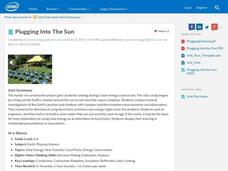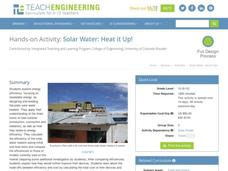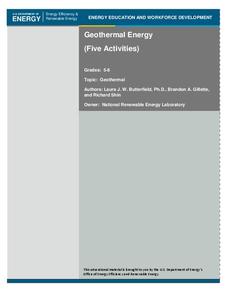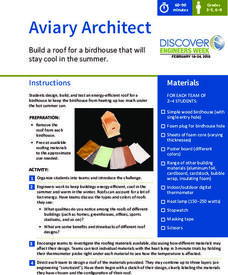Rice University
College Physics for AP® Courses
Take a look at an organized physics course. The 34-section electronic textbook covers material in AP® Physics 1 and 2. Teachers use the text to supplement lectures and have the class work through the labs. Each section contains...
Science 4 Inquiry
Investigating How Heat Flows
It is impossible to cool down a glass of water by adding ice. Young scientists explore heat transfer through videos, experiments, and interactive games. They quickly catch on that the water melts the ice and things aren't always as they...
Oceanic Research Group
Heat Transfer and Cooling
Astronauts train underwater to simulate the change in gravity. An out-of-this-world unit includes three hands-on activities, one teacher demonstration, and a discussion related to some of the challenges astronauts face. Scholars apply...
Science Matters
Thermal Energy Flow in Materials
The sun sends the earth 35,000 times the amount of energy required by all of us on the entire planet, every day. The fourth lesson in the 10-part series looks at how light energy from the sun transfers into thermal energy. Scholars build...
Intel
Plugging into the Sun
What's cooking? A sizzling STEM unit challenges scholars to build a solar cooker that can successfully cook an egg. The unit opens with a study of Earth's rotation, the sun's energy, and shadows. Pupils use a compass and thermometer to...
US Department of Energy
Thermodynamics—Teacher Guide
I'm so cool! No, you're exothermic. This thermodynamics lab unit includes an introduction, teacher demonstrations, six labs that students rotate through each class day, homework assignments, application of knowledge, and...
American Chemical Society
Changing State: Melting
Dry ice is extremely cold — it is -109.3°F or -78.5°C. Scholars observe and explain the molecular motion associated with melting. Then they design their own experiments to speed up the melting process. Finally, a teacher presents a...
American Chemical Society
Heat, Temperature, and Conduction
How does heat move from one item to another, even when the items are in different states of matter? Pupils experiment with adding washers to hot water and adding hot washers to room temperature water to observe the heat transfer.
Teach Engineering
Solar Water: Heat it Up!
Young engineers are instructed to design and build their own solar water heaters. Then, they calculate the efficiency and cost and compare them to commercially available models. This is a full unit for pupils to apply their knowledge.
Captain Planet Foundation
Solar Cooking Race
Study heat transfer with activities that focus on how heat energy works. Using a solar cooker, ice cubes, and heat transfer bracelets, kids experiment and record what they find by keeping ice cubes cold and vegetables hot.
Scholastic
Study Jams! Heat
Raise the temperature in your class with this hot film! Cartoon teens discuss thermal energy, the conservation and transfer of energy, three methods of heat transfer, conductors, and insulators. The publisher effectively packed every...
US Department of Energy
Geothermal Energy
With Earth Day quickly approaching, as well as many science fairs, why not challenge your class to investigate geothermal energy or other renewable energy resources? There are five driving questions explored in depth here, as well as...
Center Science Education
Feeling the Heat
What is an urban heat island? Middle school meteorologists find out by comparing temperatures at different locations on campus. They relate their findings to what might be happening in a concrete jungle and how it impacts local weather....
National Geographic
Expedition Clothing Then and Now
Introduce your class to the Everest expedition to reenact a 1924 climb by George Mallory and Andrew Irvine. Discuss and show pictures of the types of clothing worn at that time and compare it to today's state-of-the-art climbing gear....
Curated OER
Heat and the Second Law of Thermodynamics
More than a week's worth of investigation is provided in this source. Physical science stars experiment to describe specific heat, conduction, convection, and radiation. They also discover the relationship between mechanical and thermal...
Curated OER
Phase Changes of Water
A micro-unit on the phase changes of water includes three laboratory activities. Junior scientists compare the densities of ice and water, and then they do the same for cold and warm water. They examine freezing and boiling temperatures....
Curated OER
Heat Transfer Demos
Step-by-step instructions are given for two hands-on activities. Young scientists cut out a paper spiral and hold it over a hot plate to demonstrate convection, and they place a small piece of wax on the end of a metal rod opposite the...
Curated OER
How Hot Is It?
Discuss the difference between conduction, convection and radiation of thermal energy, and complete activities with your class by investigating the difference between temperature, thermal energy and the heat capacity of different materials.
DiscoverE
Aviary Architect
Groups of two to four work collaboratively to engineer a birdhouse that will stay cool in the summer heat. Teams examine several different-colored roofs, testing the efficiency of each with a heat lamp. Then, groups sketch their ideas,...
Beyond Benign
What's In a Window?
Take a peek inside a window to heat efficiency. Scholars watch a demonstration to investigate how heat dissipates from several different cups of hot water. Scholars then relate the exchange to how heat escapes from the windows of a...
Bonneville
Bioreactor Water Circulation System
Make those microbes warm up water. Pupils first investigate water pumps, then design a water circulation system that uses solar energy. A bioreactor in the system takes energy from compost and helps heat water.
Bonneville
Creating the Most Effective Solar Heater
If changing one variable can improve a design, why not try changing more? Using the results from the previous activity, scholars decide on the variables that caused the most improvement in the effectiveness of the solar heater. They take...
Bonneville
Manipulating Design Variables on Solar Heaters
Always strive to make things better. The second of three activities in the Experimenting with Solar Heaters unit has learners design new solar heaters that are more effective compared to the simple models they used in the previous...
Bonneville
Making the Standard Solar Heater
Heat up a lesson on solar energy. The first of three parts in the Experimenting with Solar Heaters unit has scholars construct solar heaters. They then use them to heat up a container of water and calculate the amount of heat energy...

























